

Project Ophelia, Dell’s Android-based USB-stick sized computer, will target remote workers, retailers and emerging markets, the company told TechWeekEurope at Mobile World Congress (MWC) in Barcelona.
The device was first unveiled at the Consumer Electronics Show (CES) in January and was created using technology developed by virtual desktop client specialist Wyse Technology, which Dell acquired last year.
Project Ophelia is seen as part of Dell’s transition from predominantly a hardware manufacturer to a company that can offer end-to-end solutions, explained David Angwin, marketing director at Dell Wyse.
“The rationale for this is that customers have been telling us for a long time that they want the price point for the end user device to keep coming down,” he said. “They like having just one screen on their desk, so they’d like to have the client built into the screen rather than having separate boxes”
Dell has made all-in-one units before, but Angwin said that it was difficult to please everyone who wanted different screen sizes and formats. TechWeekEurope saw Project Ophelia running on a large LCD television screen, connected via an MHL (Mobile high-definition link) port that also powers the device.
Project Ophelia can also be connected to a screen or monitor via an HDMI connection, but this does not power the device, which has no battery. It can instead be powered through a Micro USB port, which can also be used to connect peripherals such as a keyboard and mouse.
In-built Bluetooth allows wireless accessories to be connection and an ARM Cortex A9 processor enables high-definition video.
Android 4.1.2 Jelly Bean is the operating system of choice and brings access to a range of local applications and software from the Google Play store, including Angry Birds Star Wars, which was shown to work perfectly with a mouse input.
Clients for Citrix, VMWare and Dell’s own PocketCloud provide access to corporate content, which makes it an option for working at home. “We see it being used in a couple of different environments,” said Angwin, who suggests that businesses could provide remote workers one of its computers rather than a heavy laptop.
Its space saving qualities could attract retailers, while the ability to control it from the cloud could prove valuable for digital signage, which has traditionally used PCs strapped to the back of monitors. Project Ophelia’s fewer moving parts and simpler operating system would use less power, increasing efficiency.
Its green credentials mean that it could be used in emerging markets where electricity is at a premium. The computer uses just two watts of power, so if connected to an LED screen that uses ten watts, it could be powered using a solar panel.
It is currently only Wi-Fi compatible, but there has been interest from a number of people in adding support for 3G and 4G networks.
“Here at MWC, we’re talking to service providers who are interested in making this part of a solution,” said Angwin. “Can this be bundled with an airtime package, applications as a service package as parts of a subscription package?”
One of the key themes at MWC this year was how to get the ‘next billion’ people online in countries where fixed broadband connections are rare and expensive. Stephen Elop claimed during the conference that mobile Internet had the power to affect more people than the Industrial Revolution did in Europe during the 18th century.
It is unclear when Project Ophelia will be launched, but it is expected to ship during the first half of 2013 and cost less than $100.
How well do you know the cloud? Take our quiz!
Denial from TSMC, after multiple reports it was in talks with Intel over a joint…
CEO Tim Cook talks to Trump official, as IDC notes China's smartphone market growth, and…
Another big name chip maker expects a hefty financial charge, after the US tightened rules…
More bad news for Google. Second time in less than a year that some part…
Federal office that tackled misinformation and disinformation from hostile nations is closed down, after criticism…
After Nvidia admits it will take $5.5 billion charge as Trump export limits of slower…